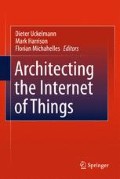Abstract
This article aims to argue that, as we move into an era of ubiquitous computing, where the traditional Internet evolves to embrace an Internet of Things, it may be beneficial to embed an “Idea of Man” into its systems design. The “Idea of Man” is a holistic philosophical concept that considers what Man is, what Man should be, and how Man lives with others in society. The article provides arguments for the relevance of the Idea of Man in system design in general. I argue that the Idea of Man influences the power relationship between men and computer systems as well as the values that we build into these systems. Furthermore, I argue that programmers’ Idea of Man influences the values which embed systems. Finally, I highlight future challenges involved in integrating an Idea of Man into systems. The article is a viewpoint and its arguments are purely deductive. Its contribution is that it shows how the Idea of Man could serve as a foundation for a variety of considerations relating to computer ethics. If we take today’s Idea of Man in the Western world, which views men as responsible and mature, able to act rationally, and capable of defining themselves through moral autonomy and freedom of choice, we establish high level guidance for how systems should be built and what an Internet of Things could, or should not, do for us.
Access this chapter
Tax calculation will be finalised at checkout
Purchases are for personal use only
Preview
Unable to display preview. Download preview PDF.
References
Article 29 Working Party (2005) Results of the Public Consultation on Article 29 Working Document 105 on Data Protection Issues Related to RFID Technology. http://ec.europa.eu/justice/policies/privacy/docs/wpdocs/2005/wp111_en.pdf. Accessed 7 December 2010
Acquisti A, Grossklags J (2005) Privacy and Rationality in Individual Decision Making. IEEE Secur Priv 3:26–33
Baumann Z (1995) Ansichten der Postmoderne. Argument Verlag, Hamburg
Beck U (1986) Risikogesellschaft. Auf dem Weg in eine andere Moderne. Suhrkamp, Frankfurtam Main
Bizer J, Günther O, Spiekermann S (2006) TAUCIS - Technikfolgenabschätzungsstudie Ubiquitäres Computing und Informationelle Selbstbestimmung. Humboldt University Berlin, Unabhängiges Landeszentrum für Datenschutz Schleswig-Holstein (ULD), Berlin, Germany
Bundessverfassungsgericht (2010) Konkrete Ausgestaltung der Vorratsdatenspeicherung nicht verfassungsgemäß. 1 BvR 256/08, 1 BvR 263/08, 1 BvR 586/08, Karlsruhe
Claburn T (2010) Google Sorry About Buzz Privacy. InformationWeek. http://www.informationweek.com/news/windows/security/showArticle.jhtml?articleID=2229 00563. Accessed 7 December 2010
Diemer A (1978) Elementarkurs Philosophie - Philosophische Antropologie. Econ Verlag, Düsseldorf
Eickelpasch R, Rademacher C (2004) Identität. transcript Verlag, Bielefeld
Ernst & Young LLP (2002) Privacy: What Consumers Want
Fahrenberg J (2007) Menschenbilder - Psychologische, biologische, interkulturelle und religiöse Ansichten. Institut für Psychologie, Universität Freiburg, Freiburg
Fleisch E, Mattern F (2005) Das Internet der Dinge - Ubiquitous Computing und RFID in der Praxis, Springer Verlag, Berlin, Heidelberg, New York
Fitts PM (1951) Human Engineering for an Effective Air-Navigation and Traffic-Control System. Columbus, Ohio, USA
Friedman B, Kahn P (2003) Human values, ethics, and design. In: Jacko J, Sears A (eds) The Human-Computer Interaction Handbook. Lawrence Erlbaum Associates, Mahwah, NY, USA
Kant I (1784/1983) Was ist Aufklärung?. Wissenschaftliche Buchgesellschaft, Darmstadt
Kurbel K (2008) System Analysis and Design. Springer Verlag, Heidelberg
Lahlou S, Langheinrich M, Röcker C (2005) Privacy and Trust Issues with Invisible Computers. Commun ACM 48:59–60
Nielsen J (1993) Usability Engineering. Morgan Kaufman, Mountain View, CA, USA
Norman D (2007) The Design of Future Things. Basic Books, New York, USA
Reeves B, Nass C (1996) The Media Equation: How People Treat Computers, Television, and New Media Like Real People and Places. Cambridge University Press, New York, USA
Sheridan TB (2000) Function allocation: algorithm, alchemy or apostasy?. Int J Hum-Comput Stud 52:203–216
Sheridan TB (2002) Humans and Automation: System Design and Research Issues. John Wiley & Sons, Santa Monica, USA
Spiekermann S, Cranor LF (2009) Engineering Privacy. IEEE Trans Softw Eng 35:67–82
Te'eni D, Carey J, Zhang P (2007) Human Computer Interaction - Developing Effective Organizational Information Systems. John Wiley & Sons, Inc, New York, USA
Wandke H (2005) Assistance in human-machine interaction: a conceptual framework and a proposal for a taxonomy. Theor Issues Ergon Sci 6:129–155
Weiser M (1991) The Computer of the 21st Century. Sci Am 265:94–104
Weizenbaum J (1977) Die Macht der Computer und die Ohnmacht der Vernunft. Suhrkamp Verlag, Frankfurt
Zhang P (2005) The importance of affective quality. Commun ACM 48:105–108
Author information
Authors and Affiliations
Editor information
Editors and Affiliations
Rights and permissions
Copyright information
© 2011 Springer-Verlag Berlin Heidelberg
About this chapter
Cite this chapter
Spiekermann, S. (2011). About the “Idea of Man” in System Design – An Enlightened Version of the Internet of Things?. In: Uckelmann, D., Harrison, M., Michahelles, F. (eds) Architecting the Internet of Things. Springer, Berlin, Heidelberg. https://doi.org/10.1007/978-3-642-19157-2_2
Download citation
DOI: https://doi.org/10.1007/978-3-642-19157-2_2
Published:
Publisher Name: Springer, Berlin, Heidelberg
Print ISBN: 978-3-642-19156-5
Online ISBN: 978-3-642-19157-2
eBook Packages: EngineeringEngineering (R0)

